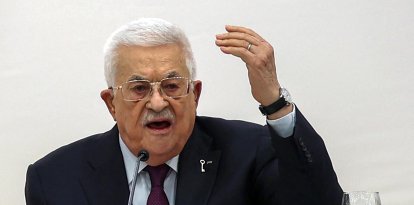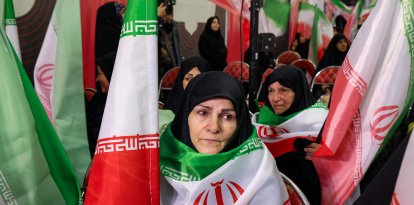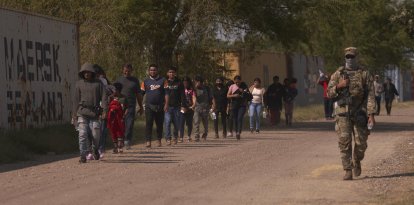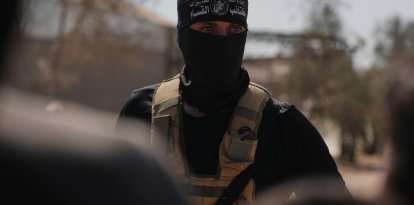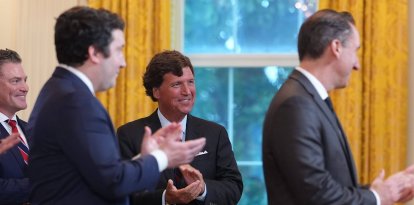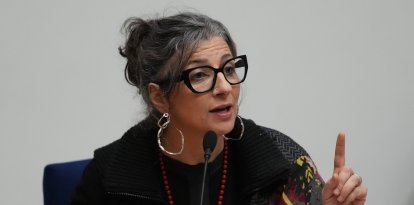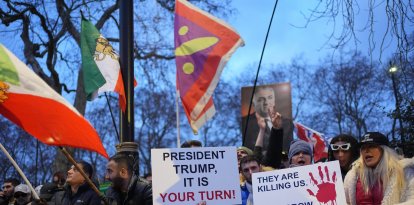From Islam to Christianity: Ayaan Hirsi Ali tells the reason for her conversion in a powerful essay
The writer's essay could be "one of the biggest pivotal moments culturally since 9/11," if it resonates enough.

From Islam to Christianity: Ayaan Hirsi Ali tells the reason for her conversion in a powerful essay
This week, Egyptian intellectual and writer Hussein Aboubakr Mansour wrote "Ayan Hirsi Ali's announcement is one of the biggest pivotal moments culturally since 9/11 and I don't know how many people actually realize that."
At first, it seems like an exaggeration. Ayaan Hirsi Ali, the renowned Somali-American activist, writer and politician who suffered genital mutilation in her childhood by the religion she professed, Islam, published an essay a couple of days ago in which she recounts her conversion to Christianity.
What Hussein Aboubakr says is true if, and only if, Ayaan's words in his essay resonate. Because if it happens, we could be facing an important cultural event due to the argumentative weight of the text.
First, Ayaan Hirsi Ali tells of her childhood when the Muslim Brotherhood took over her community in Nairobi, Kenya in 1985. She, raised under the precepts of Islam, experienced firsthand the radicalization of her community. Hatred and fear grew within each Muslim. The infidel was a traitor, and pleasure, whether through books, music, dance or cinema, was a betrayal.
Living in fear after fleeing Kenya made atheism so attractive for Ayaan Hirsi Ali.
"As an atheist, I thought I would lose that fear," she writes.
But what changed? Why did I become a Christian?
The answer is in the world we live in today. The threats to our civilization multiply. Calmness is gaining ground on our borders and in the hearts of our civilizations.
Ayaan Hirsi Ali mentions four threats in particular: "the resurgence of great-power authoritarianism and expansionism in the forms of the Chinese Communist Party and Vladimir Putin's Russia; the rise of global Islamism, which threatens to mobilize a vast population against the West; and the viral spread of woke ideology, which is eating into the moral fiber of the next generation."
Today, faced with the dilemma that is opening up in the Middle East, with the war between Hamas and Iran against Israel, the Western world trembles to define itself. In Berlin, Madrid and New York, thousands march with anti-Semitic chants, calling for the destruction of Israel and praising the bloody work of Islamist terrorist groups. Nobody does anything.
Latin America is being taken over by China, with commercial and political agreements with countries governed by the left. While Russia expands its margin of influence, also penetrating fragile Latin American countries in the face of the expansionist will of the new tsar.
We endeavor to fend off these threats with modern, secular tools: military, economic, diplomatic, and technological efforts to defeat, bribe, persuade, appease, or surveil. And yet, with every round of conflict, we find ourselves losing ground. We are either running out of money, with our national debt in the tens of trillions of dollars, or we are losing our lead in the technological race with China.
Ayaan then asks, "But we cannot fight these formidable forces unless we can answer the question: What unites us?"
For her, it is clear: "The only credible answer, I believe, lies in our desire to maintain the legacy of the Judeo-Christian tradition."
It is tradition, it is the repertoire of ideas on which human life, our freedom, dignity, the rule of law, the Republic, democracy, freedom of expression and individual freedom, science, health, art, culture, music, whether secular or not; food, exercise, happiness, crying have been built. Everything that makes us great.
"To me, this freedom of conscience and speech is perhaps the greatest benefit of Western civilization. It does not come naturally to man. It is the product of centuries of debate within Jewish and Christian communities. It was these debates that advanced science and reason, diminished cruelty, suppressed superstitions, and built institutions to order and protect life, while guaranteeing freedom to as many people as possible."
And why Judeo-Christian and not Islamic?
"Unlike Islam, Christianity outgrew its dogmatic stage. It became increasingly clear that Christ's teaching implied not only a circumscribed role for religion as something separate from politics. It also implied compassion for the sinner and humility for the believer."
That evolution, it must be said, has not occurred in the bowels of Islam. Ayaan Hirsi Ali has been accused of being one of the leading promoters of Islam's evolution as a Muslim. Her proposals did not generate debate in the Islamic world. Quite the opposite: death threats and the murder of filmmaker Theo van Gogh, her partner in the making of the short film "Submission."
In his book, "The Crisis of Islam," historian Bernard Lewis explains why Islam is a warlike religion that does not conceive of the separation of Church and State. And this is where the big discussions lie today in the Middle East.
Life and meaning
Although valid and convincing, returning to tradition is not the only argument that pushed Ayaan Hirsi Ali to become a Christian. As an atheist, although she had discovered the freedom of conscience, she suffered from the emptiness left by the absence of faith.
"I have also turned to Christianity because I ultimately found life without any spiritual solace unendurable—indeed very nearly self-destructive. Atheism failed to answer a simple question: What is the meaning and purpose of life?"
Atheist intellectuals, who are many and very valuable, sometimes consider that the way to maximize man's faith and intelligence lies in rejecting God and religion.
But, Ayaan explains, the "God gap," which is that void that remains after the withdrawal of the church, is not occupied by reason but by "irrational and quasi-religious dogmas."
"The result is a world in which modern cults prey on dislocated masses, offering them spurious reasons to be and act, not least by performing virtue signaling in the name of a victimized minority or our supposedly doomed planet," she writes.
Then, she speaks as a prophecy of the phrase that Chesterton once brandished: "When men choose not to believe in God, they do not thereafter believe in nothing, they then become capable of believing in anything."
"In this nihilistic vacuum, the challenge before us becomes civilizational. We can't withstand China, Russia, and Iran if we can't explain to our populations why it matters that we do. We can't fight woke ideology if we can't defend the civilization that it is determined to destroy. And we can't counter Islamism with purely secular tools."
"To win the hearts and minds of Muslims here in the West, we have to offer them something more than videos on TikTok," she adds.
Finally, Ayaan Hirsi Ali reflects that, from her life under the power of the Muslim Brotherhood, she learned that the power of a unifying history, like that of Islam, was enough "to attract, engage, and mobilize the Muslim masses." Therefore, the writer proposes to offer something equally significant, or the erosion of Western civilization will be imminent.













